This is the “WE…WEI…WHAT?” column by Manya Koetse, original publication in German by Goethe Institut China, visit Yi Magazin: WE…WEI…WHAT? Manya Koetse erklärt das chinesische Internet.
It’s the biggest Chinese movie of the moment: The Battle at Lake Changjin (长津湖). The war epic dominated all top trending lists on Chinese social media during the Golden Week holiday this year, and it became an unprecedented box office hit after it premiered on September 30, just one day before the celebration of the National Day of the People’s Republic of China.
The blockbuster, literally titled ‘Changjin Lake’ in Chinese, even became the highest-grossing film anywhere in the world during the first weekend of October, beating the much-anticipated James Bond movie No Time to Die.
Three weeks after its premiere, the movie grossed over 5 billion yuan ($792 million) and smashed 24 records in Chinese film history, including becoming the first Chinese film ever to break 400 million yuan at the daily box office for six consecutive days. The Battle at Lake Changjin is set to become the nation’s highest-grossing film ever.
Everything about Changjin Lake is big, from its unparalleled budget to all-star cast and production team. Written by Lan Xiaolong (兰晓龙) and Huang Jianxin (黄欣), the three-hour film is directed by famous film directors Chen Kaige (陈凯哥), Tsui Hark (徐克) and Dante Lam (林超贤), and features big names including Chinese actors Wu Jing (吴京) and Jackson Yee (易烊千玺). The production involved as many as 7000 crew members and 70,000 extras over 200 days of filming.
The movie is by no means China’s first big movie focused on the history of war. Why this movie has become such a major hit has to do with a combination of several factors. Here, we’ll explore how the film’s specific topic and narrative, the timing of its premiere and online media dynamics contributed to Changjin Lake’s unprecedented success and the social media craze surrounding it.
Changjin Lake: “The Motherland Will Never Forget”
Three bright red characters are prominently featured on the movie poster for The Battle at Lake Changjin: 长 津 湖 Chang Jin Hu (Changjin Lake), Chinese for what is also known as Chosin, the man-made lake located in the northeast of the Korean peninsula where one of the most important and harrowing battles of the Korean War (1950-1953) took place.
Below the title, the poster shows six smiling soldiers sitting on an American tank, in the background, the remains of battle are visible in between the snow-covered mountains under white sky.
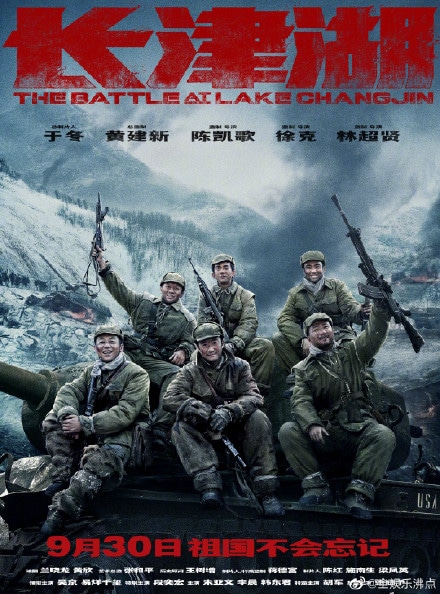
The official movie poster for The Battle at Lake Changjin.
The movie tagline, also displayed on the poster in red characters, says: “The motherland will never forget” (“祖国不会忘义“). But what is it exactly that China will “never forget”?
It was November 27 of 1950 when the Battle of the Chosin Reservoir began. The Korean War had started just five months before, on June 25, when North Korea invaded South Korea. The American-led U.N. forces, commanded by Douglas MacArthur, came to support South Korea. By early October, they had crossed over the 38th Parallel in an attempt to occupy North Korea and soon neared the Chinese border.
The government of the newly-established People’s Republic of China, led by Mao Zedong, ordered the Chinese People’s Volunteers Force (CPVF) to join North Korea in the war, referred to as ‘the War to Resist America and Aid Korea’ (抗美援朝战争). For multiple reasons, the U.N. advance into North Korea posed a threat to the brand-new communist regime, and Mao eventually sent approximately 260,000 “volunteers” to the Korean front in October of 1950.1
The movie Changjin Lake provides a Chinese perspective on the start of the Korean War and the lead-up and unfolding of the battle of Chosin Reservoir, a massive ground attack of the Chinese 9th Army Group against American forces, preventing them from driving Kim Il-Sung and his government out of North Korea.
The film specifically follows the Wu brothers, company commander Wu Qianli (Wu Jing) and the young volunteer soldier Wu Wanli (Jackson Yee), and their fellow soldiers fighting side by side in extreme conditions.
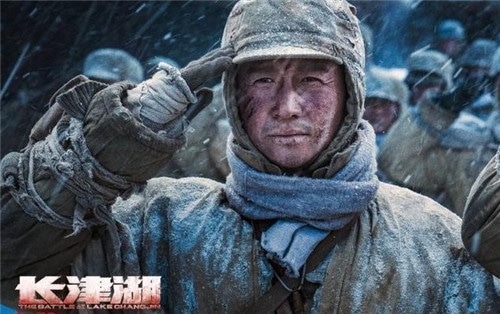
Through elaborate and spectacular battle scenes, Changjin Lake shows the violent confrontations and brutal sufferings during the battle, that went on for seventeen days. Some 150,000 Chinese soldiers encircled and attacked the U.N. forces from the surrounding hills at the Chosin area.
Tens of thousands of lives were lost on both the Chinese and American side in the bitter cold and fierce fighting. From the start of the attack to December 14th, nearly 30,000 Chinese men died of frostbite at the site of the battle and the surrounding snowcapped mountains, where temperatures would drop 20-30 degrees below zero.2
The Chosin battle and the Korean War are generally not as well-known in the U.S. and Europe as they are in China. In America, the Korean War is even referred to as the “Forgotten War”, even though it played a major role in the international community and shaped the world as we know it today.
The Changjin Lake movie is the living proof of how the Korean War and the Chosin battle are anything but forgotten in China. The Chinese attack at Chosin is remembered as a glorious victory and strategic success for turning around the war situation in Korea and leading to a withdrawal of most of the UN forces by late 1950. The battle set the stage for the ceasefire that eventually ended the war in 1953.
The epilogue of Changjin Lake also explains how the battle “completely tipped the scales of the Korean War” and “set a perfect example for annihilating a U.S. reinforced regime,” calling Chosin “the greatest setback in the history of the Marine Corps.”
The movie’s narrative and script recurringly underline why this particular historical event should not be forgotten by the Chinese people. In one of the film’s earlier scenes, Mao Zedong (played by Tang Guoqiang, the actor who has played Mao over a dozen times) talks to military leader Peng Dehuai in the days leading up to China’s decision to send out troops to North Korea:
“[Our] country is newly established and thousands of things are waiting to be done. If it’s for our current situation, I really don’t want to fight this war. But if it’s for the future, and the peaceful development of our country over a few decades or a century, we must fight this war. The foreigners look down on us. Pride can only be earned on the battlefield.”
It is a scene that is telling for the narrative the movie conveys about the Chosin battle and the war at large, during which the Chinese troops were severely underestimated by the well-equipped U.N. forces.
After the ‘Century of Humiliation,’ the time from the mid-1800s to the mid-1900s during which China was attacked, weakened, and torn by foreign forces, the Korean War and Chosin battle showed that the military strength of the People’s Republic of China was a new force to be reckoned with. By showing this strength, China did not just save the North Korean regime but also defended its own borders and the nation’s prestige.
The determination and fighting spirit of the Chinese soldiers at Chosin as depicted in the movie – one impressive scene shows dozens of soldiers frozen into “ice sculptures” while still in battle posture – strikes a chord with Chinese audiences.
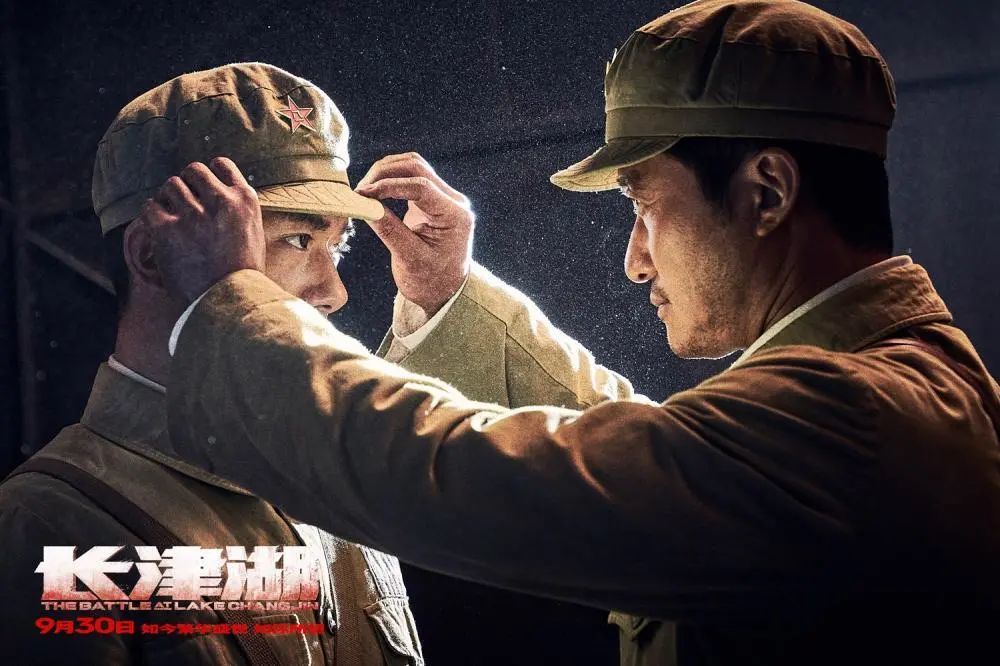
Promotional image for Changjin Lake, showing the two brothers Commander Wu Qianli (right, played by Wu Jing) and Wu Wanli (played by Jackson Yee).
At one point in the movie before the battle begins, a member of the Chinese People’s Volunteer Army says: “If we don’t fight this battle, it will be our next generation who will fight it.”3 It is a line that is brought up by many netizens on Chinese social media.
“I was very moved after I watched the film, and this phrase just stayed with me,” one Weibo commenter writes: “They sacrificed their blood to bring us peace, and I salute them.”
Another Weibo user shares the phrase, along with a photo of cinema tickets for Changjin Lake, writing: “I am grateful for the blood that was shed by countless revolutionary martyrs for the stable lives we now have. National peace and stability are not easy to gain. We should cherish every day.”
When the narrative of the movie and China’s role in the Korean War was questioned by former journalist Luo Changpin (罗昌平) on his Weibo account in October of this year, he was arrested for defaming national heroes and martyrs. Luo allegedly mocked Chinese soldiers by saying they “never doubted the ‘wise decisions’ of their higher-ups.”
A hashtag related to the news of his arrest (#罗昌平被批捕#) garnered over 350 million views on Weibo, with many netizens condemning Luo’s criticism and applauding his detainment.
“I hope they give him frozen potatoes to eat,” one popular comment said, referring to the Chinese soldiers in North Korea who had nothing else to eat. Many felt that there was just one punishment that would be appropriate for him: “They should send him to Chosin, the weather is cold up there.”
Relevant Timing: “The Chinese Are Not to Be Messed With”
The specific timing for The Battle at Lake Changjin to premiere in Chinese theatres is noteworthy and has helped in boosting its success.
Firstly, the movie was released during the National Holiday, the seven-day holiday period starting 1 October that has become the most important movie season in China and annually sees the launch of the biggest domestically produced movies. Changjin Lake’s premiere coincided with China’s Martyr’s Day on September 30, which commemorates Chinese national heroes who sacrificed life to protect the motherland.
The Chinese epic was also launched as part of the 100th anniversary of the Communist Party of China. This anniversary has played a major role in China’s popular culture over the past year, with various movies and TV series being launched dedicated to the hundred years of history since the Communist Party was founded in 1921.
Perhaps more importantly, the popularity of The Battle at Lake Changjin comes at a time of escalating political tensions between the U.S. and China, accompanied by a rise of Chinese nationalism.
Chinese state outlet Global Times recently emphasized how ticket sales of the Changjin Lake movie were boosted amid China-US tensions, quoting Chinese film critic Xiao Fuqiu, who said that the popularity of Changjin Lake “fits the national sentiment in the constant rivalry between China and the US.”
Exploring how the launch of the movie and its success relates to anti-American sentiments in China leads to somewhat of a chicken and egg situation. Was the hit movie launched because of the current geopolitical climate, or are Chinese audiences more receptive to the theme because of it? The answer is probably somewhere in the middle, and one conclusion doesn’t exclude the other.
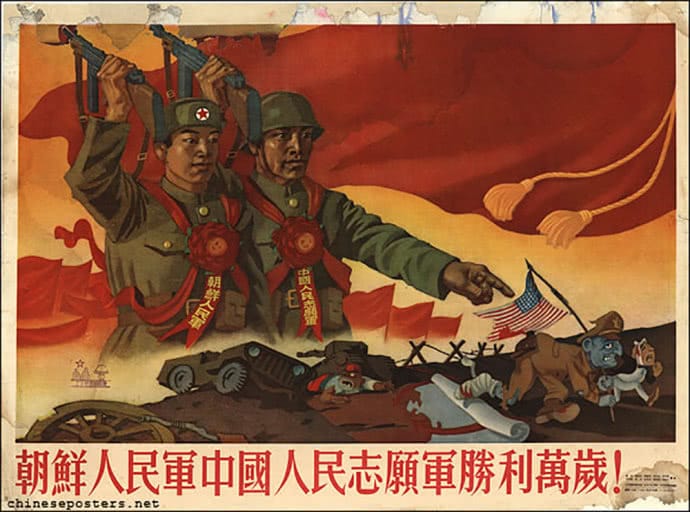
Chinese Korean War propaganda poster, via Chineseposter.net.
In 2019, during the initial phases of the US-China trade war, CCTV 6, the movie channel of China’s main state television broadcaster, surprised Chinese audiences by changing their schedule and playing ‘anti-American’ Korean War movies for three nights in a row. The move showed that there is an apparent urgency for Chinese popular films to draw attention to events that are deemed of historic importance in today’s political climate.
The day before the launch of Changjin Lake, various Chinese media included a quote by one of the movie’s writers, Huang Jianxin, in saying that the film is supposed to convey that “the Chinese are not to be messed with.”4
After it became clear just how much the movie had raised at the box office, English-language Chinese state media Global Times seemed to gloat about the success, writing that “the movie pushed the patriotic sentiment of people across the country to a peak amid the tense China-US competition and China’s effective control of the epidemic.”
The Social Media Era of Chinese Blockbusters
Just twenty days after the premier of Changjin Lake, a hashtag dedicated to the film hit a staggering 2.2 billion views on Weibo (#电影长津湖#). Besides this hashtag, there are countless other hashtags, online discussions, and fan groups dedicated to the movie on Chinese social platforms from Weibo and Zhihu to Bilibili, TikTok, and Douban.
The premier of Changjin comes at a time when China’s commercial cinema is increasingly thriving. Over the past few years, several locally-made films have become major hits in China – not just in the cinemas, but also on social media.
One of the highest-grossing films in mainland China of the past years is the patriotic “Rambo-style” action blockbuster Wolf Warrior II (战狼2, 2017), which also features Wu Jing as the hero star. The film tells the story of a special forces soldier who battles foreign mercenaries and helps Chinese and African citizens during a local war in Africa. The film became a social media sensation in 2017 and broke box office records.
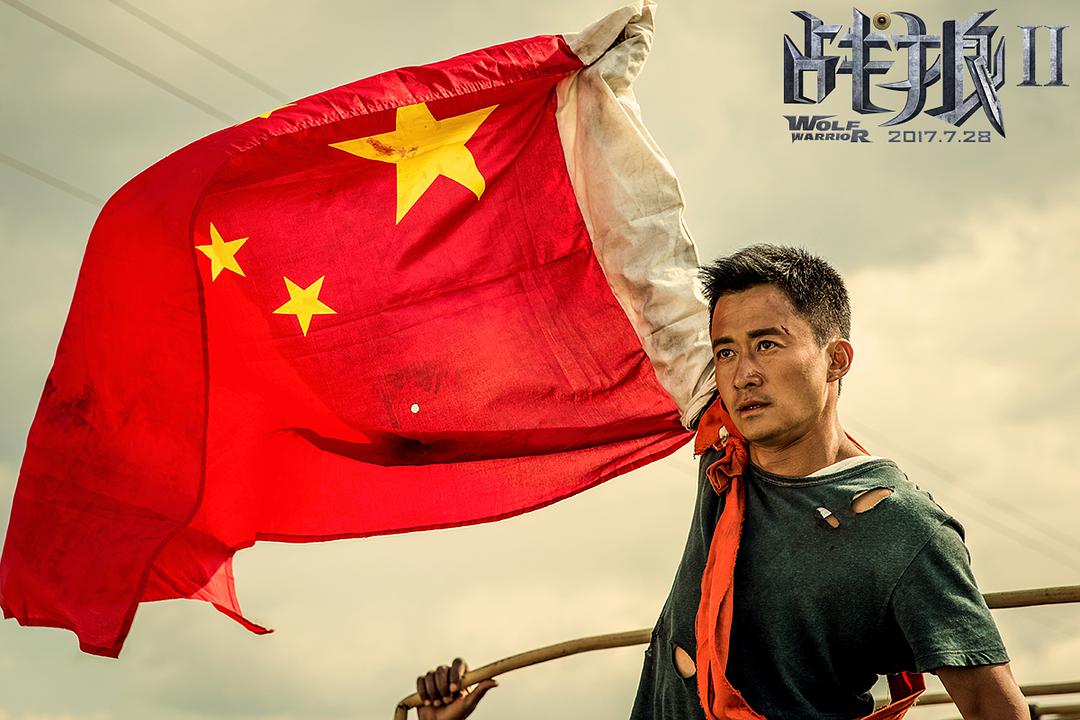
Movie poster for Wolf Warrior II.
The Battle at Lake Changjin is similar to Wolf Warrior II in various ways: they’re both Hollywood-style commercial entertainment blockbusters that are set overseas, incorporate official narratives, and are immensely patriotic, speaking to the growing nationalist sentiments among Chinese moviegoers and netizens. Both movies were huge topics on Chinese social media, with online fan groups and discussions snowballing their popularity.5
In “The Era of Baokuan Films: How Chinese Social Media Creates Box Office Successes” (2021), author Xiao Yang argues that there is an emergence of a group of movies in China that become major hits (‘baokuan’ 爆款) through the Internet and social media, relying on online marketing strategies and netizens’ involvement in the film’s promotion.
Rather than just passive movie watchers, the social media era has made Chinese audiences more active in interacting with domestic movies, producing their own content, including opinions, feedback, and memes.6 The success of major Chinese movies such as The Wandering Earth (流浪地球2019), Ne Zha (哪吒之魔童降世 2019) or Dying to Survive (我不是药神2018) could partly be attributed to the interplay between social media and film engagement.
One example of the new dynamics between Chinese movies and the online environment is the 2021 hit movie Hi, Mom (你好,李焕英), which features the story of a daughter who travels back in time and meets her own mother as a young woman and befriends her. The movie led to an online trend in China of netizens sharing stories and photos of their mothers when they were young, triggering online discussions on what they would tell their mums if they could go back in time.
Although the movie and its online marketing strategy initially sparked the trend, the social media responses further added to the success of the film. In this way, film audiences also become marketers of the movies they are interacting with.
In this social media age, Chinese movies also have their own official accounts to promote their movie and define their online presence. The Changjin Lake movie has its own account on Weibo and on TikTok, and the film started its online marketing campaign as early as October of 2020, a year before its premiere.
The official online presence of Chinese movies also means they can interact with fans and other accounts. On October 20 of 2021, just when it became known that Changjin Lake had grossed over 5 billion yuan, the account of the super-popular Chinese fantasy adventure blockbuster Ne Zha congratulated Changjin Lake via social media on its new ranking in the Chinese box office record charts, emphasizing that the movies were standing “side by side” in the progress of Chinese cinema.
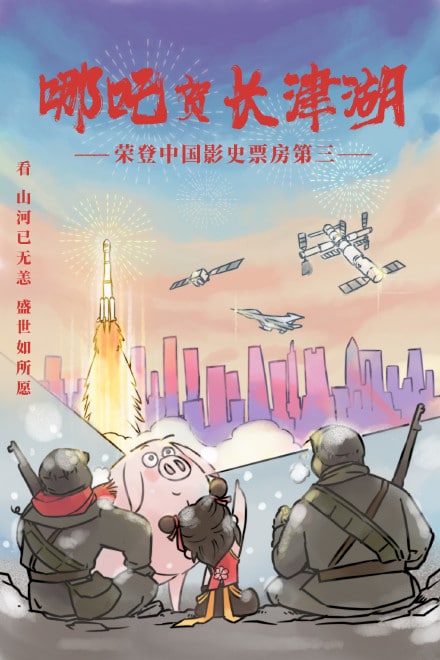
The hit movie Ne Zha congratulates Changjin Lake for its box-office success.
This interaction between two of the biggest Chinese movies of the past years in China garnered a lot of attention on Weibo, where people applauded both films. A hashtag dedicated to Na Zhe congratulating Changjin Lake (#哪吒给长津湖的贺图#) was viewed over 170 million times. “I love you both! Together we will further promote Chinese cinema,” one popular comment on Weibo said.
Engaging with Changjin: Eating Frozen Potatoes to Show Solidarity
Over the past weeks, netizens interacted with Changjin Lake in various ways, starting discussion groups, fan clubs, and sharing experiences of going to see the movie.
Considering that The Battle at Lake Changjin was made with government support and guidance,7 it is perhaps unsurprising to see that Chinese state media have also been actively promoting the movie on social media in various ways. Since long before the premiere of Changjin Lake, state media outlets including People’s Daily and Xinhua have consistently been featuring news relating to the movie through their channels.
The official Study Xi, Strong Country app, a Chinese app where users can score points by learning Xi Jinping Thought, issued a service where points could be exchanged for Changjin Lake movie tickets.
Besides the direct promotion of the movie itself, Chinese media outlets have also come up with other initiatives related to the movie. CCTV posted various videos on social media featuring Chinese veteran volunteer soldiers. One video was dedicated to a 93-year-old Korean War veteran Li Changyan, who is described as “the real Wu Qianli,” launching the Weibo hashtag “Wu Qianli from the Movie Really Exists” (#电影中的伍千里真实存在#).
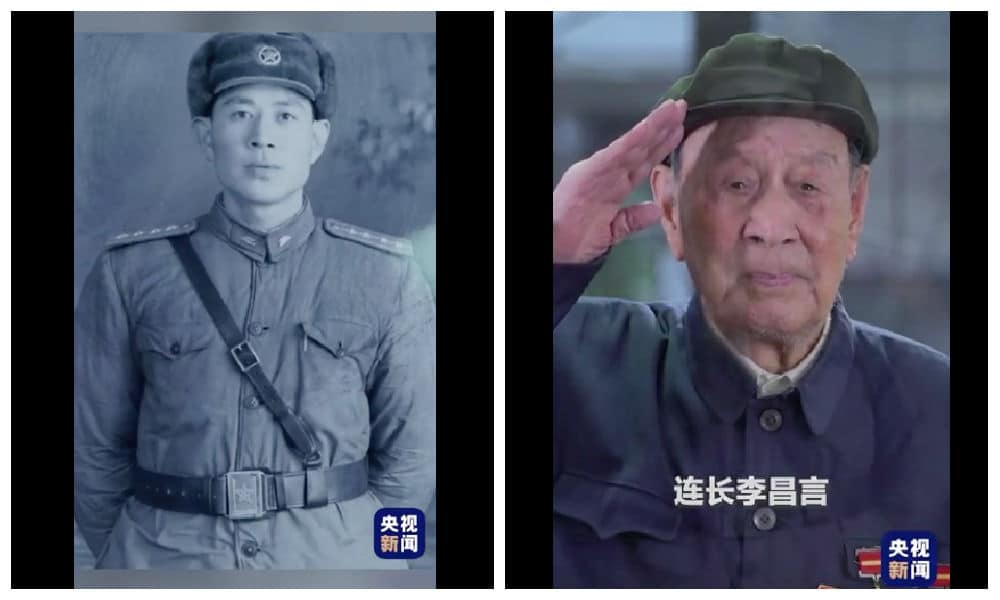
“Wu Qianli from the movie really exists,” a short video portraying the 93-year-old Commander Li Changyan.
These kinds of initiatives further strengthened the online presence and hype of the Changjin Lake movie, inviting more interaction between the movie, the media, and netizens.
Besides the online discussions and art works dedicated to the film, there were also social media users who, inspired by the scenes of the soldiers on the battlefield, prepared frozen potatoes to try for themselves. Some local cinemas even distributed frozen potatoes to audiences before the movie.
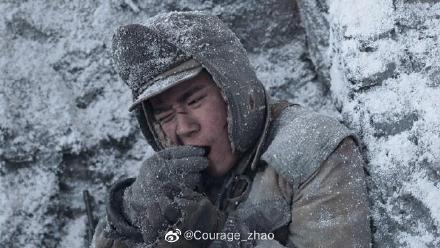

The trend was sparked by one young woman from Yunnan, who decided to film herself while eating frozen potatoes after watching Changjin Lake. Applauded as a gesture of solidarity, the move went viral and saw over 590 million views on Weibo alone (#女孩看完长津湖回家尝冻土豆#). Since then, many people on Weibo and TikTok have posted videos of themselves eating frozen potatoes to honor the Chinese soldiers.
Trends such as these helped build hype around the movie, making the movie even more popular for its popularity.8 Showing personal engagement with the film, countless social media users in China are posting photos of their movie tickets.
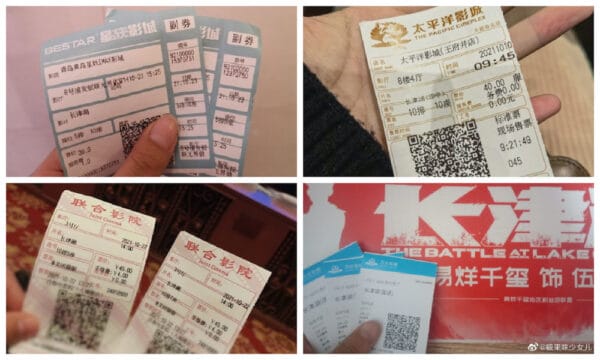
See my ticket! Netizens showing others on social media that they went to see the movie.
Others also share selfies at the cinema with official Changjin Lake merchandise, which includes memorabilia such as big drinking cups, toy figures, or a military vehicle that is actually a popcorn box.


Moviegoers sharing photos of the official merchandise they got when watching Changjin Lake.
Whether it’s on social media, at the box office, or in Chinese official media, The Battle at Lake Changjin definitely is the biggest movie of the year and has come to represent much more than just the film alone.
“The mighty martyrs of the People’s Volunteer Army will never be forgotten,” is the last sentence featured in Changjin Lake before the movie ends. Several videos on social media show how some moviegoers in local theaters across China stand up and salute the cinema screen after the film has ended – 21st century Chinese moviegoers have never been more dedicated to watching a film.
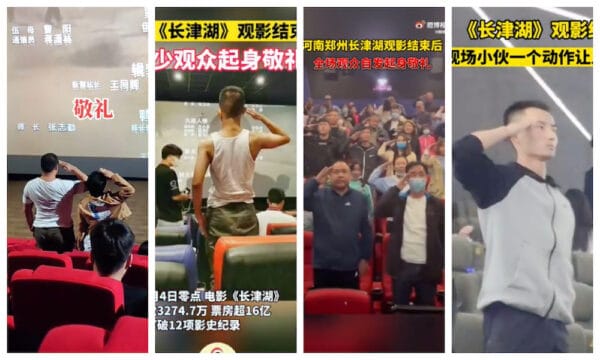
Various videos circulating on social media show Chinese moviegoers saluting after the ending of the Changjin Lake movie.
For some on social media, the hype surrounding the epic war movie has led to a fear of missing out. With so many internet users sharing a photo of their cinema visit on social media throughout October, one Weibo user posted an image with her movie ticket on October 23, writing: “I feel like I’m the last person in China to go and see this movie.”
Watch the trailer for The Battle at Lake Changjin here.
By Manya Koetse
Follow @whatsonweibo
1 For more on this, see: Li, Xiaobing. 2020. Attack at Chosin: The Chinese Second Offensive in Korea. Norman: University of Oklahoma Press, page 29-31.
2 Li, Attack at Chosin, page 16, 32.
3 Chinese: “如果这一仗我们不打,就会是我们的下一代打”
4 “让大家看到:中国人是不好惹的”
5 For more on this see: Berry, Chris. 2018. “Wolf Warrior 2 : Imagining the Chinese Century.” Film Quarterly 72(2): 38-44.
6 Xiao Yang. 2021. “The Era of Baokuan Films: How Chinese Social Media Creates Box Office Successes.” Journal of Chinese Cinemas 15(1), page 108.
7 Wang Jiequn, director of the Beijing Municipal Film Administration and part of the Communist Party’s propaganda office in Beijing, reportedly said at a news conference in September of 2021 that the authorities had “organized and planned” the production together with the film’s makers, Bona Film Group and Bayi Film Studio (See: Myers, Steven Lee & Amy Chang Chien. 2021. “For China’s Holidays, a Big-Budget Blockbuster Relives an American Defeat.” The New York Times, October 8 [10.21.21]
https://www.nytimes.com/2021/10/05/world/asia/battle-lake-changjin.html).
8 Xiao Yang (2021) refers to the “Matthew effect”: popular products get more popular (116).
Featured image by Ama for Yi Magazin.
This text was written for Goethe-Institut China under a CC-BY-NC-ND-4.0-DE license (Creative Commons) as part of a monthly column in collaboration with What’s On Weibo.
Spotted a mistake or want to add something? Please let us know in comments below or email us. First-time commenters, please be patient – we will have to manually approve your comment before it appears.
The post The Unforgotten Victory: Why ‘The Battle at Lake Changjin’ Is One of China’s Biggest Films Yet appeared first on What's on Weibo.